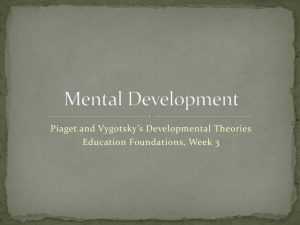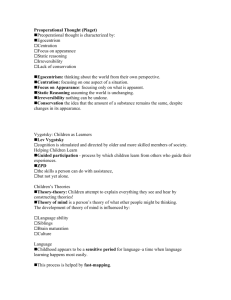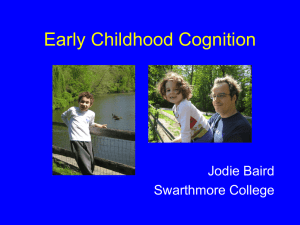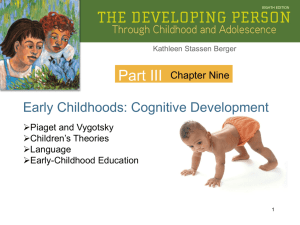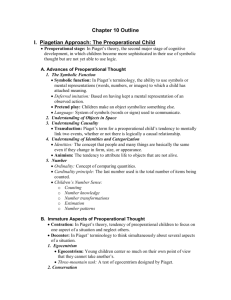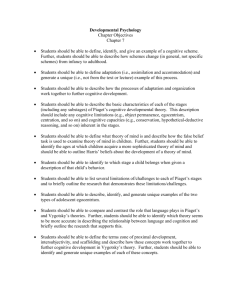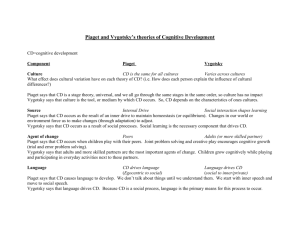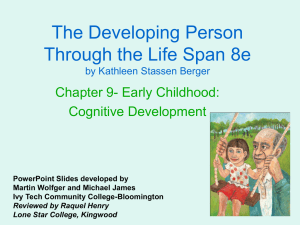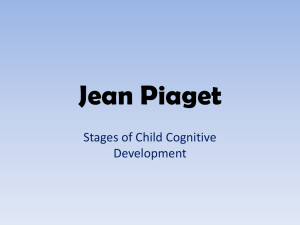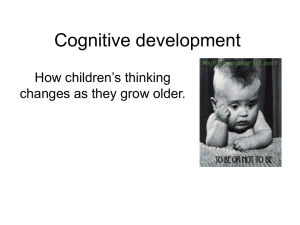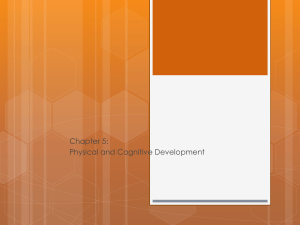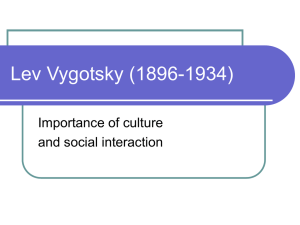pdf compact
advertisement
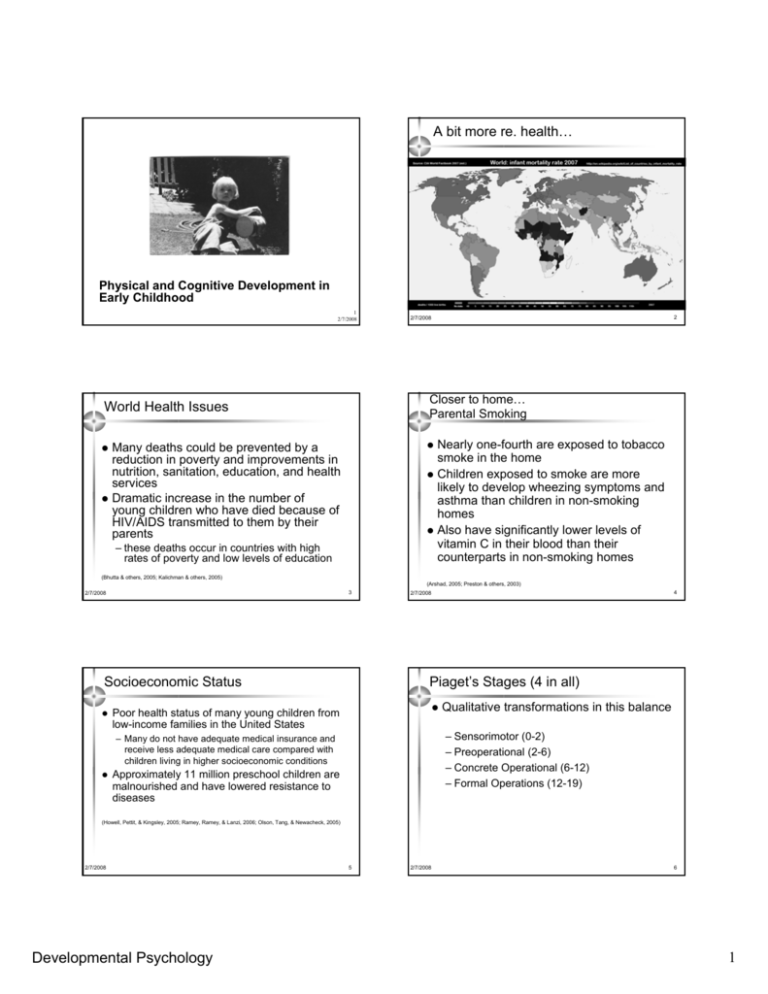
A bit more re. health… Physical and Cognitive Development in Early Childhood 1 2/7/2008 2 2/7/2008 Closer to home… Parental Smoking World Health Issues Nearly one-fourth are exposed to tobacco smoke in the home z Children exposed to smoke are more likely to develop wheezing symptoms and asthma than children in non-smoking homes z Also have significantly lower levels of vitamin C in their blood than their counterparts in non-smoking homes z Many deaths could be prevented by a reduction in poverty and improvements in nutrition, sanitation, education, and health services z Dramatic increase in the number of young children who have died because of HIV/AIDS transmitted to them by their parents z – these deaths occur in countries with high rates of poverty and low levels of education (Bhutta & others, 2005; Kalichman & others, 2005) (Arshad, 2005; Preston & others, 2003) 3 2/7/2008 Socioeconomic Status z Piaget’s Stages (4 in all) z Poor health status of many young children from low-income families in the United States Qualitative transformations in this balance – Sensorimotor (0-2) – Preoperational (2-6) – Concrete Operational (6-12) – Formal Operations (12-19) – Many do not have adequate medical insurance and receive less adequate medical care compared with children living in higher socioeconomic conditions z 4 2/7/2008 Approximately 11 million preschool children are malnourished and have lowered resistance to diseases (Howell, Pettit, & Kingsley, 2005; Ramey, Ramey, & Lanzi, 2006; Olson, Tang, & Newacheck, 2005) 2/7/2008 Developmental Psychology 5 2/7/2008 6 1 Cognitive Development z Preoperational Stage Piaget’s Preoperational Stage z – from approximately 2 to 7 years of age – children begin to represent the world with words, images, and drawings – form stable concepts and begin to reason – dominated by egocentrism and magical beliefs – Child does not yet perform operations -which are reversible mental actions 1) Egocentrism 2) Confusion of Appearance with Reality 3) Non-logical reasoning 7 2/7/2008 Three major limitations: 8 2/7/2008 Theory of Mind 3 Mountain Task Awareness of one’s own mental processes and the mental processes of others z Studies view the child as “a thinker who is trying to explain, predict, and understand people’s thoughts, feelings, and utterances” z Children’s theory of mind changes as they develop through childhood z (Harris, 2006; Flavell, Miller, & Miller, 2002) 9 2/7/2008 Theory of Mind z Theory of Mind: Beyond age 5 Not until middle and late childhood do children see the mind as an active constructor of knowledge or processing center z Then they can move from understanding that beliefs can be false to realizing that the same event can be open to multiple interpretations z Age 2 - 3, children begin to understand three mental states: – perceptions – emotions – desires z Age 4 - 5, they come to understand that the mind can represent objects and events accurately or inaccurately (Flavell, Green, & Flavell, 2000; Carpendale & Chandler, 1996) – they realize that people can have false beliefs -- beliefs that are not true 2/7/2008 Developmental Psychology 10 2/7/2008 11 2/7/2008 12 2 Appearance/Reality Distinction Difficulty telling difference between how things seem and how things are z Example: z – Maynard-the-cat studies (DeVries, 1969) 13 2/7/2008 14 2/7/2008 Non-logical Reasoning Non-logical Reasoning z z Precausal Thinking (or Intuitive Reasoning) z z – Can’t reason cause-and-effect 2/7/2008 15 16 Preoperational Thought: Intuitive Thought Substage Between ages of 2 and 4 Child gains the ability to mentally represent an object that is not present z Egocentrism -- inability to distinguish between one’s own perspective and someone else’s perspective z Animism -- the belief that inanimate objects have life-like qualities and are capable of action z Between approximately 4 and 7 years of age z Begin to use primitive reasoning and ask all sorts of questions z Questions signal the emergence of interest in reasoning and in figuring out why things are the way they are z “Intuitive” because children seem sure about their knowledge and understanding z z (Gelman & Opfer, 2004) Developmental Psychology E.g., I haven’t had a nap, so it isn’t afternoon E.g., There are no cemetaries in NYC, so people don’t die there 2/7/2008 Preoperational Thought: Symbolic Function Substage 2/7/2008 Reasoning from one particular to another 17 2/7/2008 18 3 Centration and Limits of Preoperational Thought z Another limitation of preoperational thought is centration -- centering of attention on one characteristic to the exclusion of all others. – centration is most clearly evidenced in young children’s lack of conservation z Lack of conservation: lack of awareness that altering an object’s or substance’s appearance does not change its basic properties 19 2/7/2008 Non-logical Reasoning z 20 2/7/2008 Language and Thought z Failure of Conservation According to Vygotsky (1962), children use speech not only for social communication, but also to help them solve tasks -- children use language to plan, guide, and monitor their behavior – language for self-regulation is called private speech – for Piaget, private speech is egocentric and immature – for Vygotsky, it is an important tool of thought during the early childhood years (John-Steiner, 2007; Wertsch, 2007) 21 2/7/2008 2/7/2008 22 2/7/2008 24 Comparing Piaget’s and Vygotsky’s Theories z z Vygotsky’s emphasis on the importance of inner speech in development The main implication of Vygotsky’s theory for teaching is that students need many opportunities to learn with a teacher and more-skilled peers 2/7/2008 Developmental Psychology z Piaget’s view that such speech is immature z Implication of Piaget’s theory for teaching is that children need support to explore their world and discover knowledge 23 4 Evaluation of Piaget: Kids want to know why you’re asking such stupid questions! Evaluating Vygotsky Critics say Vygotsky overemphasized the role of language in thinking z Emphasis on collaboration and guidance has potential pitfalls z – Facilitators might be too helpful – Some children might become lazy and expect help when they might have done something on their own 2/7/2008 Developmental Psychology 25 2/7/2008 26 5
